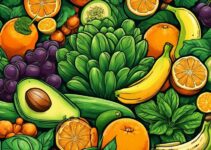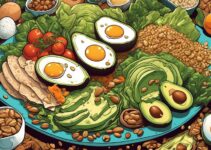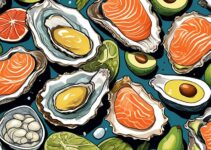If you've ever seen a garden flourishing with vibrant, healthy plants, you understand the importance of nurturing the soil with the right nutrients. Similarly, your body requires essential nutrients to maintain optimal hormone levels, including testosterone. As a vegetarian, you might be curious about how to naturally boost your testosterone levels without incorporating animal products into your diet. There are indeed specific vegetarian foods that can support healthy testosterone levels, and understanding the key nutrients and lifestyle factors involved can help you cultivate an environment within your body that supports hormonal balance and overall well-being.
Key Takeaways
- Vegetarian diets require attention to plant-based sources of nutrients that support healthy testosterone levels.
- Zinc, found in legumes, nuts, and seeds, is vital for testosterone production.
- Vitamin D, obtained through sunlight exposure and fortified foods, is important for testosterone synthesis.
- Incorporating foods like spinach, almonds, quinoa, avocado, and tofu can help boost testosterone levels in a vegetarian diet.
Importance of Testosterone in Vegetarian Diet
Boost your testosterone levels naturally with a well-planned vegetarian diet rich in essential nutrients and plant-based compounds. Hormonal balance is crucial for overall health, and testosterone plays a key role in maintaining this balance. When following a vegetarian diet, it's essential to pay attention to plant-based sources that can support healthy testosterone levels.
Certain nutrients and compounds found in plant-based foods are known to positively impact testosterone levels. For instance, zinc, which is abundant in foods like legumes, nuts, and seeds, is vital for testosterone production and maintaining hormonal balance. Additionally, vitamin D, primarily obtained through sunlight exposure and fortified foods, is important for testosterone synthesis. Including fortified plant-based milk, cereals, and mushrooms in your diet can help ensure an adequate intake of vitamin D.
Moreover, plant compounds such as phytoestrogens, found in foods like soybeans and flaxseeds, may have a modulating effect on testosterone. While some research suggests that phytoestrogens could potentially affect hormone levels, the overall impact on testosterone in humans is still being studied. However, consuming these foods in moderation as part of a balanced diet is unlikely to significantly impact testosterone levels.
Key Nutrients for Testosterone Production
When focusing on maintaining hormonal balance through a vegetarian diet, it is crucial to understand the essential nutrients that play a key role in supporting testosterone production and overall health. To support testosterone production, consider the following key nutrients:
- Zinc: Zinc is a vital mineral for testosterone production and overall reproductive health. Plant-based sources of zinc include legumes (such as chickpeas, lentils, and beans), nuts (like almonds, cashews, and peanuts), seeds (such as pumpkin and sesame seeds), and whole grains. Ensuring adequate intake of zinc is essential for maintaining healthy testosterone levels.
- Vitamin D: This fat-soluble vitamin is crucial for testosterone production and can be obtained from plant-based sources such as fortified plant milks, fortified orange juice, and UV-exposed mushrooms. Vitamin D also plays a role in nutrient absorption, making it essential for overall health and hormone regulation.
- Magnesium: Magnesium is involved in hundreds of biochemical reactions in the body, including testosterone synthesis. Plant-based sources of magnesium include leafy green vegetables (such as spinach and kale), nuts, seeds, and whole grains. Ensuring adequate magnesium intake is important for supporting overall health and testosterone production.
It's important to note that while these nutrients are essential for testosterone production, their absorption can be influenced by various factors, such as the presence of phytates and oxalates in certain plant foods. Pairing these foods with sources of vitamin C, and consuming fermented or sprouted foods, can help improve nutrient absorption. Prioritizing these key nutrients and considering factors that affect nutrient absorption can support healthy testosterone levels within a vegetarian diet.
Top Vegetarian Testosterone-Boosting Foods
To optimize testosterone levels on a vegetarian diet, incorporating specific nutrient-dense plant foods is key. Plant-based sources are essential for maintaining healthy testosterone levels. Here are some top vegetarian testosterone-boosting foods:
| Food | Benefits |
|---|---|
| Spinach | Rich in magnesium, which can help boost testosterone levels. |
| Almonds | High in vitamin E, which is linked to increased testosterone production. |
| Quinoa | Contains high levels of protein and magnesium, both of which are associated with higher testosterone levels. |
| Avocado | Packed with healthy fats that are essential for hormone production, including testosterone. |
| Tofu | A good source of plant-based protein, which is important for overall hormonal health. |
Incorporating these plant-based foods into your diet can help support healthy testosterone levels. It's important to focus on a well-rounded diet that includes a variety of nutrient-dense foods to ensure overall hormonal balance. By including these foods in your meals, you can support your body's natural testosterone production and promote overall health. Remember to pair these foods with regular exercise and a healthy lifestyle for the best results in maintaining optimal testosterone levels on a vegetarian diet.
Meal Planning for Testosterone Increase
Planning meals focused on testosterone increase can be optimized by incorporating specific nutrient-dense vegetarian foods. When meal planning for increasing testosterone levels, it's essential to ensure that your diet includes a variety of key nutrients that support hormonal balance and overall health. Here are some practical strategies and tips for creating nutrient-rich recipes that can help boost testosterone levels naturally:
- Incorporate Protein-Rich Foods: Include plant-based sources of protein such as lentils, chickpeas, quinoa, and tofu in your meals. Protein is crucial for supporting muscle growth and repair, which can indirectly support healthy testosterone levels.
- Focus on Healthy Fats: Incorporate foods rich in healthy fats, such as avocados, nuts, seeds, and olive oil. These fats are essential for hormone production and can help support optimal testosterone levels.
- Include Zinc and Vitamin D: Ensure that your meal plan includes foods high in zinc and vitamin D, as these nutrients are linked to testosterone production. Pumpkin seeds, almonds, spinach, and fortified plant-based milk or cereals are excellent sources of zinc and vitamin D.
Lifestyle Factors for Optimizing Testosterone
Optimize your testosterone levels by prioritizing lifestyle factors that support hormone production and overall well-being. Exercise routines play a crucial role in maintaining healthy testosterone levels. Resistance training, such as weightlifting or bodyweight exercises, has been shown to significantly increase testosterone levels. Aim for at least 30 minutes of moderate to high-intensity exercise most days of the week. Incorporating compound exercises like squats, deadlifts, and bench presses can be particularly effective in boosting testosterone.
In addition to exercise, stress management is essential for optimizing testosterone. Chronic stress can lead to increased levels of the hormone cortisol, which can suppress testosterone production. Engage in stress-reducing activities such as yoga, meditation, deep breathing exercises, or spending time in nature. Getting an adequate amount of sleep is also crucial for hormone regulation. Aim for 7-9 hours of quality sleep each night to support healthy testosterone levels.
It's important to note that excessive exercise or extreme stress on the body can have the opposite effect on testosterone levels. Finding a balance in your exercise routine and stress management practices is key. Listen to your body and give it the rest and recovery it needs. By incorporating regular exercise and effective stress management techniques into your lifestyle, you can help optimize your testosterone levels naturally and support overall well-being.
Frequently Asked Questions
Can Vegetarian Foods Really Boost Testosterone Levels as Effectively as Non-Vegetarian Options?
Yes, vegetarian foods can effectively boost testosterone levels. Incorporating exercise routines and protein sources like tofu and lentils can positively impact hormone levels. Even with dietary restrictions, plant-based options such as spinach and quinoa can influence testosterone production. Research supports the link between certain vegetarian foods and increased testosterone. So, if you're looking to naturally boost your testosterone levels, consider incorporating these plant-based options into your diet and exercise routine.
Are There Any Specific Vegetarian Foods That Are Known to Have a Negative Impact on Testosterone Levels?
Certain vegetarian foods have been found to have a negative impact on testosterone levels. Soy products, such as tofu and edamame, contain compounds that may interfere with hormone regulation. Additionally, flaxseeds and mint have been associated with reduced testosterone levels. It's important to be mindful of your intake of these specific foods if you're focused on maintaining optimal testosterone levels while following a vegetarian diet.
How Does the Timing of Meals and Snacks Affect Testosterone Production in a Vegetarian Diet?
You won't believe how crucial meal timing is for optimizing testosterone production in a vegetarian diet. Hormonal response to food intake is influenced by when you eat. For vegetarians, spacing out meals and snacks can help maintain stable blood sugar levels, which in turn supports healthy testosterone levels. Aim for balanced, nutrient-dense meals and snacks throughout the day to keep your hormones happy and your testosterone in check.
Are There Any Vegetarian Supplements That Can Help Increase Testosterone Levels?
To naturally boost testosterone levels on a plant-based diet, consider incorporating vegetarian supplements. Some options like zinc, vitamin D, and ashwagandha have been shown to support hormone regulation. These supplements can potentially aid in increasing testosterone levels. However, it's important to consult with a healthcare professional before adding any new supplements to your routine to ensure they are safe and effective for your individual needs.
Can Incorporating Certain Herbs or Spices Into a Vegetarian Diet Help Boost Testosterone Naturally?
Incorporating herbs and spices into your vegetarian diet can be a natural and effective way to boost testosterone levels. For instance, research has shown that certain herbs like ashwagandha and fenugreek, along with spices like ginger and turmeric, have been linked to increased testosterone production. These natural alternatives are great options for those following a vegetarian diet and looking to support healthy testosterone levels.
Conclusion
So, there you have it – incorporating these vegetarian testosterone-boosting foods into your diet can help optimize your hormone levels. Remember, it's not just about what you eat, but also about your overall lifestyle. So, make sure to get enough sleep, manage stress, and stay physically active to keep your T levels in check. It's all about finding that perfect balance for a healthy and thriving body. Keep calm and boost on!



